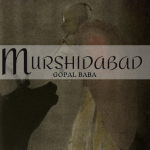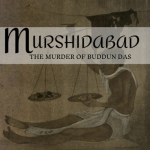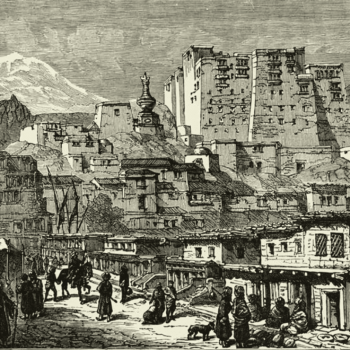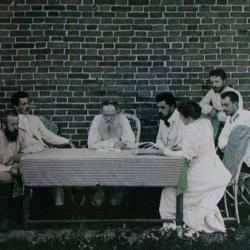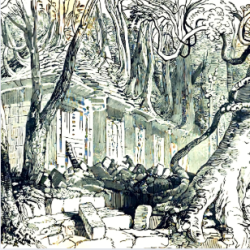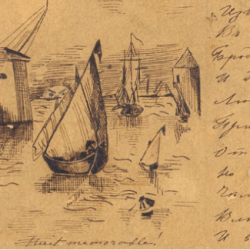VEROCHKA’S LETTERS
Vera Johnston
April 14, May 4, May 11, 1889
In Verochka’s next letter, dated (Berhampore) April 14, 1889, she mentions a visit by Dinanath Ganguli, perhaps in connection with the recent “kidnapping” at the Treasury. A veteran vakil, and legal advisor of the Nawab, Dinanath had close ties with the prince.[1] This may also explain how Dinanath came to disclose that the Nawab was secretly a member of the Theosophical Society:
Today is a particularly difficult day for me. It is our sixth month wedding anniversary, and Charley is in jubilant spirits—especially since it is Sunday, and there is no business which requires his attention. Theosophists from over 30 miles away come to visit us. The other day, Dinanath Ganguli, president of the local branch [Adhi Bhoutic Bhratri T.S.,] called on us. The old man makes fun of Olcott a little, but is in awe of aunt. Grand bien lui fasse.[2] I liked him; he is an aristocrat of aristocrats, a brahmin to all brahmins. Incidentally, he told me in confidence, that the little Nawab, despite the bliss and luxury of his Eastern harems, is a member of the [Theosophical] Society, “but secretly for fear of the Jews.”[3] Tableau![4]
In a letter written on May 4, 1889, Verochka describes a visit from an unnamed clerk:
This clerk, like every local man, is a great admirer of Elena Petrovna, but not a Theosophist. When Charley asked him why he would not become a member, he, quite sensibly, answered that in India, in the view of majority, to be a Theosophist meant wearing long hair, not using an umbrella, and obeying Olcott.[5] He did not want to be associated with any of these things, but that does not prevent him from reading aunt’s essays with pleasure. I fully share his opinion. Charley is so rebuilt against Adyar. There is an idiotic letter from Harte which states that, in his opinion, Adyar and aunt are subject to the laws of polarity and must be repelled accordingly. He asked Charley if he knew about the new rules of aunt’s Esoteric Section; he was curious to know because aunt, for some reason, did not want to tell those at Adyar. Charley was so upset that he wanted to issue a sharp reply at once. I begged him not to interfere with this new Theosophical mess. This is all such nonsense. What a pity aunt wasted so much of her strength and health on a stupid Society which crawls about in every direction like a hive of insects.[6]
With Theosophy it is nothing but abuse. Harte says, and prints, that Charley expressed such-and-such convictions; aunt is angry, and the rest of the company in London declare that they never authorized [Charley] to express what Harte attributes to him. Charley is convinced that he never said such things. I think, perhaps, he forgot—or maybe he didn’t even say it. Such nonsense. We’ve wasted so much time and money at stupid Adyar, with no pleasure, no reward, and now, to top it all off, we are berated with criticism.[7]
This bit of “drama” which involved the Johnstons in India, began with Richard Harte’s publication of The General Report Of The Thirteenth Convention Of The Theosophical Society in which he stated:
Mr. Charles Johnston, Delegate of the British Section of the Theosophical Society, followed in an oral address in which he conveyed to the Convention the fraternal salutations of the Fellows composing the Societies in the United Kingdom, just grouped together in the British Section of the Theosophical Society, for organizing and extending the theosophical movement. He and his British colleagues are fully convinced that this step will result in material benefit to the cause of the Society. They believe that it would be most advantageous to extend the system to the whole family of Branches throughout the world. They also think that the full executive authority should be restored to the President. It was further their opinion that Fees and Dues should be abolished, and the Society be placed upon a basis of voluntary support. As the President had intimated that he intended to place him on the Committee for the amendment of the Rules, he would not make any further remarks at present.[8]
In the report of the Convention, it states that Johnston then furnished the rules of the new British Section. The Rules explicitly stated that there should be fees for both the support of the Section and for contributions to the Society. Johnston either exceeded his instructions and authority from the newly organized Section, or, more likely, he was not correctly reported in his remarks.[9] Later a dispute between Blavatsky and Harte would play out in the pages of The Theosophist, Lucifer, and Light, beginning in June 1889.
The trouble seems to have begun in an article titled “Applied Theosophy,” in which Harte makes the case for a strong, central, institutional foundation for the Theosophical Society at Adyar akin to Vatican and the Catholic Church.[10] In an article titled “The Situation,” Harte further describes the division between The Theosophical Society and the Esoteric Section like this: “On both sides this new departure was felt to be a relief. Occultism is above all ‘rule’ or ‘bye-law’ emanating from the will of the governed, which is the only possible basis of a popular government such as that of the Theosophical Society.”[11] Harte then wrote a condescending letter about Blavatsky on June 9, 1889, which appeared in the July 6, 1889, issue of the spiritualist journal, Light.[12] Blavatsky would respond with an editorial in Lucifer, stating: “Owing to such undignified quibbles, Adyar and especially The Theosophist are fast becoming the laughingstock of Theosophists themselves as well as of their enemies; the bushels of letters received by me to that effect, being a good proof of it.”[13] This feud would last throughout the summer.[14]
In another letter to her family, written on (Berhampore) May 11, 1889, Verochka describes the “spiritual sons” of Blavatsky from Islamapore, which, as mentioned before, have a strong resemblance to the Mozumdar brothers, and both Hari Kishto and Charu Kishto Mozumdar would join the Adhi Bhoutic Bhratri T.S. on July 23, 1889:[15]
Generally speaking, my relationship with India turns out to be much more remarkable that I thought. Aunt is referred to as “mother” in all letters in which the honor of being introduced is requested. Yesterday, once again, one of her “spiritual sons,” as he calls himself (though not a member of the Society) called on us. In the city of Islamapore…he is in alliance with 2 or three cultivators, and operates 2 schools for boys and girls. This indicates that he is very enlightened, for most of the Brahmins find it shameful for an honest woman to be literate.
Aunt instructs us to spread Theosophy, but how can one spread it here?[16] Old Eugène Gallois, for instance, recently told me while I was walking with him alone, that he was not a Christian, but rather worshipped God in the manner of Flammarion, whom he is a great reader, and confessed all of his doubts and hopes to me…The soil is fertile, yet how can I proceed after this same Eugène told me, with laughter, of his two meetings with Olcott. The first one occurred about 10 years ago when they were on a ship from Ceylon together. The captain had to ask Olcott to leave the company’s cabins, because he decided to dress in a Hindu costume, i.e., barefoot in a muslin shirt, just as he does at Adyar. Where did he even get this outfit? Even far from wealthy Indians wear leather shoes with bent toes, or low shoes in the European fashion; and even though they are wide and funny, they still wear pants made of canvas or pique. Only coolies and farmers go about without pants. Their second meeting was here. Olcott came to magnetize a woman, and offered to treat one of the Gallois clerks who suffered from eye problems. The cure, says Eugène, consisted of Olcott spitting, and offering to anoint the patient’s eyes. Of course the old Frenchman laughs and calls him: “Yankee jouant le Christ.” (A Yankee playing the Christ.)
Il n’y a pas à redire le ridicule est le plus grand obstacle. Avec la meilleure volonté du monde on ne pourrait rien faire.[17]
← Table Of Contents →
SOURCES:
[1] “Local Intelligences.’” The Englishman’s Overland Mail. (Calcutta, India) December 1, 1904.
[2] “Much good may it do to him.”
[3] This is an allusion to John 19:38: “And after this Joseph of Arimathea, being a disciple of Jesus, but secretly for fear of the Jews, besought Pilate that he might take away the body of Jesus: and Pilate gave him leave. He came therefore, and took the body of Jesus.”
[4] Johnston, V. V. “Letters of Vera Johnston,” April 14, 1889 [g.], Berhampur, India, entry.
[5] The umbrella, or chhatra, was a sign of sophistication. It was said that in ancient times, some king adopted the symbol of the umbrella as a mark of distinction. Other high-ranking officials embraced the emblem, and the presence of large, decorated umbrellas became synonymous with nobility. In time, the title of “Chhatrapati,” or “Lord of the Umbrella,” became more coveted by Mahratta Princes than even raja (king,) or maharaja (great-king.) [Birdwood, George C.M. The Industrial Arts of India. Pt. II. Chapman And Hall, Limited. London, England (1884): 241; “The Umbrella: Its History.” Arthur’s Home Magazine. Vol. LIV., No. 4. (April 1896): 249-251.]
[6] Johnston, V. V. “Letters of Vera Johnston,” May 4, 1889 [g.] , Berhampore, India, entry.
[7] Johnston, V. V. “Letters of Vera Johnston,” May 1889 [g.] , Berhampore, India, entry.
[8] “British Section.” General Report Of The Thirteenth Convention Of The Theosophical Society. (1889): 25-27.
[9] Anon. The Theosophical Movement: 1875-1925. E.P. Dutton & Company. New York, New York. (1925): 237.
[10] Harte writes: “It is this mystic individuality, ‘the sum total,’ that gives strength to all societies and congregations of men, and becomes the real dominating power, to which all contribute some of their force, and which stands behind every unit and lends its whole strength to it. Without it a Fellow of the Theosophical Society would be as powerless as any other isolated man or woman in the community. With it behind him an F.T.S. is a power in proportion to the unity and singleness of purpose of the Society to which he belongs. Who speaks when a priest of the Roman Catholic Church utters a command? The united power of the Church of Rome. Who speaks when a disfrocked priest says something? A nonentity. Who speaks when the Judge, the General, the Statesman, open their mouths? ‘The State,’—the tremendous and often tyrannical personality that comes into life and action when the units that compose it bound together, through organization, by a common will and a common purpose.” [Harte, Richard. “Applied Theosophy.” The Theosophist. Vol. X, No. 117. (June 1889): 515-524.]
[11] Harte writes: “On both sides this new departure was felt to be a relief. Occultism is above all ‘rule’ or ‘bye-law’ emanating from the will of the governed, which is the only possible basis of a popular government such as that of the Theosophical Society. The result of trying to make two such different things work harmoniously was like that which might be expected from harnessing together a ‘sacred bull’ and a draft horse—the wagon was continually running into the fence, and always in danger of being upset; a danger in no way diminished by the fact that two coachmen sat on the box seat, each of whom held one of the reins, and pulled it vigorously every now and then without much reference to the ideas of the other, or to ‘things as a whole.’ Now, happily, there has been a division of labor, each driver has got his own animal to himself. The head of the Esoteric Division is at liberty to impose pledges, institute degrees, and ordain exercises, and without let or hindrance to issue instructions and orders to those who place themselves under her guidance; and the President and General Council are free to legislate for the Theosophical Society to the best of their knowledge and ability, in conformity with the wishes of the majority of the Fellows.”
[Harte, Richard. “The Situation.” The Theosophist. Vol. X, No. 117. (June 1889): 565-568.]
[12] Harte’s letter says in part: “As to Madame Blavatsky herself, it is to her that the Theosophical Society in reality owes its existence, and any “occult” function that she has ever exercised as its ‘Corresponding Secretary’ she exercises still; but she is by nature and by training essentially an Occultist, and although no one is more deeply imbued than she is with the sentiment of the Brotherhood of Humanity, as is proved by her life and her writings, still she is necessarily, by the ‘defauts de ses queditis,’ out of touch in many respects with the world as it exists to-day, and her constitutional tendency to break the heads of her enemies, and the hearts of her friends, has been all along a terrible drawback to the proper comprehension by the public of the real nature of the Theosophical Society—a drawback which it is hoped now by all well-wishers of the Society may be minimized by the late formation of the Esoteric Division, in which she reigns supreme; the only legitimate and responsible head of the Theosophical Society before the world being now the President-Founder Colonel H. S. Olcott.” [Harte, Richard. “Theosophy and Occultism.” Light. Vol. IX, No. 444. (July 6, 1889): 327.]
[13] Blavatsky, H.P. “A Puzzle from Adyar.” Lucifer. Vol. IV, No. 24 (August 15, 1889): 506-509.
[14] On August 29, 1889, Harte writes to Blavatsky: “As to being a member of the Esoteric Section, of course I should consider it an honour and a privilege to be allowed to share your teaching. But I confess that the moral effect of belonging to the E. S. seems to me disastrous in the extreme. To say nothing of the larger wrecks, look at Judge! He used to be truthful and unselfish, and, I think, moderately large-minded; but now that he has become what Dr Buck calls ‘a sucking dove’ he does not seem to be able to tell two words of truth, he has become filled with personal ambition to rule or ruin, and if you do not pull him up by the coat-tails he will in six months have utterly disgusted the majority of the Fellows in the American Section. I do not speak personally, for Judge was as nice and kind to me as any brother when I was in a very miserable state of mind in New York, and I tell you truly that I like him personally very much. Of course I know that it is nothing in the teaching itself that makes good men act like bad ones, but there is so much wickedness in me, ready to come out on the slightest provocation, that I fear that were I to be submitted to the developing process I should become a mass of iniquities since the effect of bringing to a focus the Karma of such a good man as Judge is to confuse all his ideas of right and wrong, loyalty and rebellion, truth and falsehood.” [“Leaves Of Theosophical History.” The Theosophical Forum. Vol. V, No. 5. (January 15, 1934): 130-133. ] Blavatsky responded on September 12, 1889: “Yours received and has proved the last straw that breaks the camel’s back—or the real friendship I ever had for you. You ruin systematically the T. S. | ever since you took charge of the Theosophist; and by your tactless and indecent attack in it on the E. S. and the British Section you force me to wash publicly our dirty linen in Lucifer. I am now answering your last letter with Col. Olcott sitting near me. He will read this letter and thereafter having read yours (that famous epistle having necessitated an outlay of several pounds to telegraph to you his orders if you still recognize that we have more right in j the Theosophist than you have) he will have nothing more to learn […] Your wicked and un-Theosophical denunciation of Judge, which is as false as it is un-Theosophical falls flat again in its application to the E.S. Judge has never pledged himself, never signed anything; for as in the case Olcott, my confidence in him is sufficient to trust him without any Pledges. The numerous letters I receive from really good theosophists such as Buck, Mrs. Ver Planck, do not show their “disgust” for Judge. But they show me most decidedly for your tactless writings in the Theosophist and the showers of letters you inundate them with. If the American Section breaks with Adyar it will be your doing.” [Ibid.]
[15] [Theosophical Society General Membership Register, 1875-1942 at http://tsmembers.org/. See book 1, entry 5174. (website file: 1B:1885-1890) Hari Krishna Mozumdar. (July 23, 1889); Theosophical Society General Membership Register, 1875-1942 at http://tsmembers.org/. See book 1, entry 5175. (website file: 1B:1885-1890) Charu Krishna Mozumdar. (July 23, 1889.)] During the first year of their membership, both brothers would make also make a generous financial contribution to the Society. [Dvivedi, Manilal K. “Recording Secretary’s Report.” General Report Of The Fifteenth Convention Of The Theosophical Society. (1891): 13-31.]
[16] Johnston, V. V. “Letters of Vera Johnston,” May 11, 1889 [g.] , Berhampur , India, entry.
[17] [Johnston, V. V. “Letters of Vera Johnston,” May 11, 1889 [g.] , Berhampur , India, entry.] Vera also writes of this time: “Elena Petrovna sends us Lucifer every month, which now publishes a very good story about the Theosophical Society, written by Hartmann. It paints very accurate picture of the headquarters at Adyar, with its river, palms and island.” The series of articles Vera is referring to was “The Talking Image of Urur,” which Hartmann would publish in book form in 1890. Johnston, V. V. “Letters of Vera Johnston,” May 12, 1889 [g.] / May 1, 1889 [j.], Berhampur , India, entry; Hartmann, Franz. The Talking Image of Urur. John W. Lovell. New York, New York (1890.)


